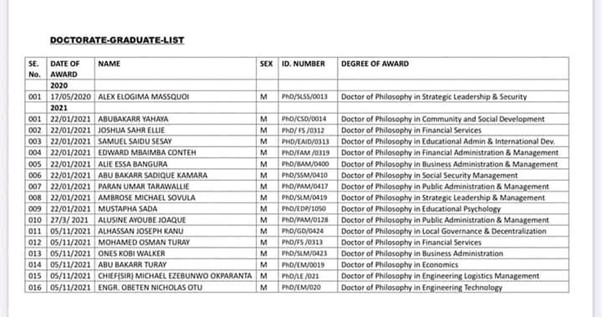The need for the banning of access courses – A rejoinder
Having gone through the Government white paper on the report of the commission of inquiry into the poor performance of pupils in the 2008 Basic Education Certificate Examination (BECE), and the West African Senior Secondary School Certificate Examination (WASSCE) including the general poor performance of our educational system in the country; one could agree with me that the previous educational system was not in entirety not very good, but it is those who were the implementers of our educational system that lacked the tenet in implementing the system should have made Sierra Leone proud of a better education that would be of benefit to our children and the nation as a whole.
Amongst the immediate recommendation in Professor Sahr .P. Thomas Gbamanja’s report was the “Banning of Access Courses” in all tertiary institutions especially for the science candidates who fail the entry requirement to gain admission in tertiary institutions. I am strongly in support of the said recommendation because it is not the proper manner to usher pupils from senior secondary into tertiary institution WASSCE is the standard and international accepted certificate in the Sub-Region and world at large.
In contrary to this recommendation of the white paper, I read an article in the Independent Observer Newspaper, page 7 of the 9th August 2010 edition written by columnist, Abdul Karim Kabia (Fonti – Roaming Pen). Titled “Should we accept the new educational system? (Part 2). In his work he made some salient points on some of the immediate recommendations of the government White Paper which includes ‘Criminalization of practice of irregular admission of pupils,’ reduction in the number of examination subjects and the criminalization of the sales of school materials supplied by government.
This position on these issues were quite good. But I strongly hold the fact that the reasons he made against the banning of access course were not well grounded. But, for the benefit of my readers, let me highlight some of his points below.
‘’Access courses were established by tertiary institutions to cater for pupils who do not obtain the requirements of entering these institutions. The tertiary institutions prepare entry exams for these pupils and those who excelled in these exams were offered admission into a one year access course. After this one year course, pupils who perform well are accepted and enrolled as students to undertake various diploma and degree courses.
As per the recommendation of the Professor Gbamanja Commission of Inquiry, government has resolved to ban all access courses in tertiary institutions. It is widely believed that the banning of access courses is aimed at motivating WASSCE pupils, as most of them exhibit laxity during the WASSCE with hopes that they can gain admission into tertiary institutions whether they perform well or not at WASSCE exams.
In my view, the banning of access courses in these tertiary institutions is counterproductive, especially with the additional year in senior secondary school.
It is first and foremost disadvantageous to pupils who would have spent four years in senior secondary school and unfortunately cannot make it in the WASSCE exams. For those who will choose the option of retaking the WASSCE, an additional one year in school, making it a total of five years in senior school, is ruinous, especially when one is not even sure whether or not he/she can pass the exams for the second time. It is very frustrating and devastating for one to become a dropout after spending good five years in senior school in a country like Sierra Leone
Out of experience, I will never agree with the notion that public examinations like BECE and WASSCE are the best ways of testing a pupil’s ability. There are hundreds if not thousands of brilliant pupils who never excel in public examinations due to obvious reasons. There is also no doubt that several people in Sierra Leone are proud owners of various degree and diploma certificates but never passed the WASSCE or ‘O’ Level public exams. These people are on record to have performed well in their respective fields of work. This was made possible with the existence of access courses. Most of these people would have been school dropouts had it not been for the access courses. Therefore, I consider the abolition of access course as an undertaking that will succeed in increasing the numbers of school dropouts, rather than motivating WASSCE pupils.
It would have been more laudable if the government’s decision was to strictly regulate the access course admission programme. Past academic records can be made a criterion for admission of pupils to the access courses, but a total ban to the programme is untenable’’.
The points I want to make against Fonti’s aforementioned position in the proscription of access courses are these. What I believe was that every government institutions have their policies and the education ministry is not an exceptional. One thing Mr. Kabia should take into cognizance was that the ministry of education of Sierra Leone reorganized the work of the West Africa Examination Council (WAEC) that conduct WASSCE for all senior secondary pupils in West Africa, so it is worthwhile for every pupil to at least get five credit in the exam before entering tertiary institution. By the matter of fact, it is cheating on the side of other students who took the WASSCE and pass, whiles their counterparts fail and are allowed to attend one year in tertiary institution before they could be enrolled in main stream tertiary work.
I strongly believe that access courses consume more time and hinder the education of any person who wants to be richly educated, by this I mean, it makes student to change their future career they want to read in tertiary institution, just because they don’t want their colleagues to be ahead of them. Some students after gaining admission in a tertiary institution they compare themselves as part of the institution hence they have hope to pass easily and be admitted in main stream with their colleagues who struggle to pass the WASSCE.
Access courses have long reaching disadvantage for students who had undergone it; those who had passed through it would testified that on many occasions they were being ignore by Universities when they want to pursue their bachelors’ degrees as they were being asked for their WASSCE. What is more painful than that! After being allowed to attend access courses and after sitting to the exam and passing and allowed entry into tertiary institution. But after completing the diploma or certificate with the hope of joining your colleagues in second year the university tells you that you to obtain five WASSE, despite your certificate and diploma. Those that make sense?
So, I am calling on all school going pupils to read extensively, research and avoid limiting themselves to their teachers’ work, so that they can pass the WASSCE, rather than relying on access course.
I have the conviction that only lazy students could be proud of gaining admission to tertiary intuition through access course.
Fonti made reference to public and private workers who are doing well in their various place of employment and who were students that pass through access courses. He might be correct but. I also want to inform him that majority of these very workers who are doing well as Fonti claims were the very ones chasing after private classes to re-sit the private WASSCE because they wanted to enter university. Rather than that no one will tell me that if he/she who wants to study abroad will show his/her access course result as against his/her O-levels or WASSCE. The shows the importance of passing the WASSCE.
Education in its broadest sense is one aspect of socialization; it involves the acquisition of knowledge and the learning of skills, whether locally or intentionally.
The 1991 Constitution of Sierra Leone Chapter II Sub Section 9 clearly made position of the government toward the education of the country. I quote “the Government shall direct it policy towards ensuring that there are equal and adequate educational opportunities for all citizens at all levels by-
- Ensuring that every citizen is given the opportunity to be educated to the best of his ability, aptitude and inclination by providing educational facilities at all levels and aspects of education as primary, secondary, vocational, technical, college and university.
- Safeguarding the rights of vulnerable groups, such as children, women and the disable in securing educational facilities; and
- Providing the necessary structure, finance and supportive facilities for education as and when practicable
- The Government shall strive to eradicate illiteracy and to this end, shall direct its educational policy towards achieving
a. free compulsory basic education at primary and junior secondary school levels; and
b. free senior secondary education and as an when practicable.
- the government shall promote the learning of indigenous language and the study and application of modern science, foreign language, technology, commerce and business.
It is from my utmost belief that the previous and present governments have done pretty well in accomplishing the above obligations. I am in favour of the recommendation on the government white paper for the banding of access courses as it does not do any good to the education system, so it must be banned!
Stay with Sierra Express Media, for your trusted place in news!
© 2010, https:. All rights reserved.







Baimaro Sesay aka the analyst,Columbus Ohio U.S.A
/
My brother I do agree with you 100% as a student that went through the WASSCE exams in 2003 coming out with flying colours from Schlenker Secondary School Port Loko with 4As,2Bs and 1C.I told Roaming Pen in his first article that the access program is not helping students presently in Sierra Leone because if a student cannot control those objective questions in the Queens language which are 100 for 60 minutes in other to get an excellent or a credit grade hoping to use the backyard/shortcut method he/she is not yet ripe for university education and is taking the calculated academic risk of been thrown out of the university system.A typical example the case of Njala University last year never in the history of that college 145 students are thrown out from a single department which occured last year due to majority of those students entered Njala through access programs with little regard for academic repute and excellence and the subsequent effect of producing substandard university graduates who cannot handle the WASSCE sylabus when hired as teachers/tutors because they did not pass it in high school.
26th August 2010